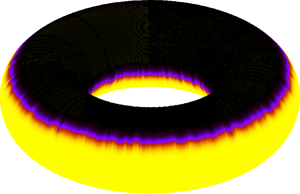Article contents
Axisymmetric flows on the torus geometry
Published online by Cambridge University Press: 24 August 2020
Abstract

We present a series of analytically solvable axisymmetric flows on the torus geometry. For the single-component flows, we describe the propagation of sound waves for perfect fluids, as well as the viscous damping of shear and longitudinal waves for isothermal and thermal fluids. Unlike the case of planar geometry, the non-uniform curvature on a torus necessitates a distinct spectrum of eigenfrequencies and their corresponding basis functions. This has several interesting consequences, including breaking the degeneracy between even and odd modes, a lack of periodicity even in the flows of perfect fluids and the loss of Galilean invariance for flows with velocity components in the poloidal direction. For the multi-component flows, we study the equilibrium configurations and relaxation dynamics of axisymmetric fluid stripes, described using the Cahn–Hilliard equation. We find a second-order phase transition in the equilibrium location of the stripe as a function of its area  ${\rm \Delta} A$. This phase transition leads to a complex dependence of the Laplace pressure on
${\rm \Delta} A$. This phase transition leads to a complex dependence of the Laplace pressure on  ${\rm \Delta} A$. We also derive the underdamped oscillatory dynamics as the stripes approach equilibrium. Furthermore, relaxing the assumption of axial symmetry, we derive the conditions under which the stripes become unstable. In all cases, the analytical results are confirmed numerically using a finite-difference Navier–Stokes solver.
${\rm \Delta} A$. We also derive the underdamped oscillatory dynamics as the stripes approach equilibrium. Furthermore, relaxing the assumption of axial symmetry, we derive the conditions under which the stripes become unstable. In all cases, the analytical results are confirmed numerically using a finite-difference Navier–Stokes solver.
Information
- Type
- JFM Papers
- Information
- Copyright
- © The Author(s), 2020. Published by Cambridge University Press
References
REFERENCES
Busuioc et al. supplementary movie 1
Development of the instability under azimuthal perturbations of a fluid stripe centred on eq c = 0:86 on the torus with a = 0:4. [See Fig. 15(a) for further details]
- 2
- Cited by

